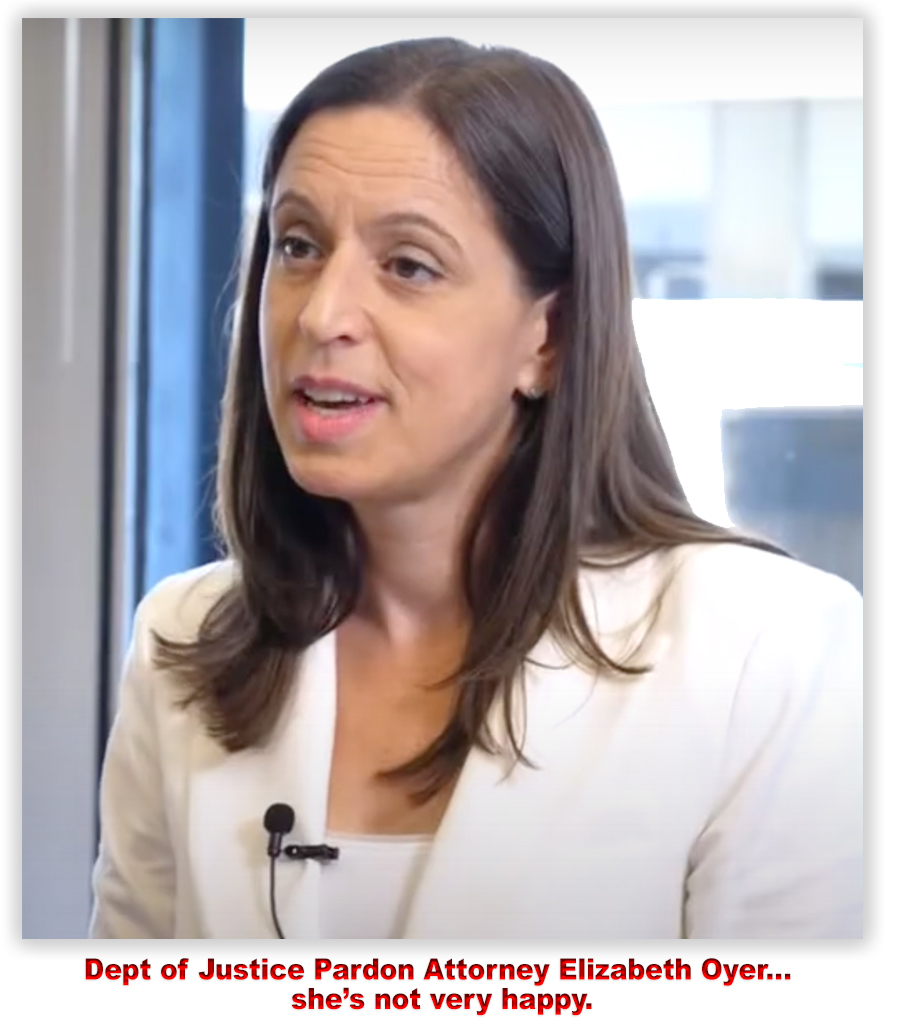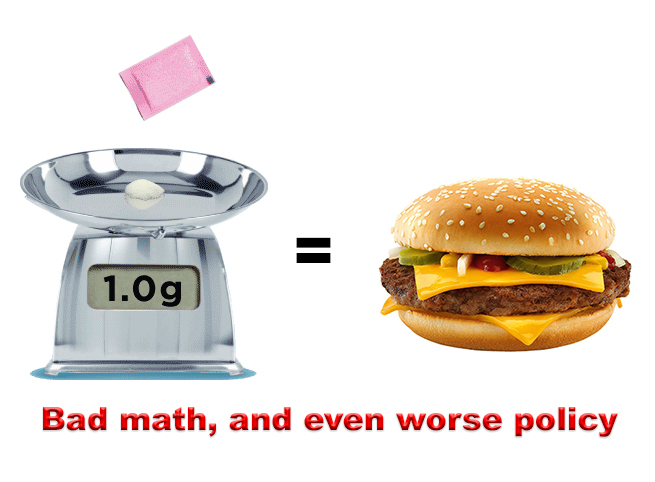We post news and comment on federal criminal justice issues, focused primarily on trial and post-conviction matters, legislative initiatives, and sentencing issues.

BIDEN DRUG COMMUTATIONS ANGER DOJ PARDON ATTORNEY
On his final Friday in office, President Joe Biden commuted the sentences of nearly 2,500 inmates serving lengthy prison terms, saying he wanted to return people serving disproportionately long sentences for nonviolent drug offenses to their communities.
Last Sunday, the Wall Street Journal reported that only 258 of those receiving commutations, about 10% of the total, had been recommended by Dept of Justice Pardon Attorney Elizabeth Oyer.
 Biden’s list included “individuals with violent backgrounds who otherwise wouldn’t meet the department’s standards for recommendation for receipt of clemency,” according to a January 18th internal DOJ email written by Oyer to dismayed and angry DOJ colleagues. “While I am a strong believer in the possibility of second chances through clemency, the process by which yesterday’s action was carried out was not what we had hoped and advocated for,” Oyer wrote in the email – labeled “confidential and law enforcement sensitive” – that was leaked to the Wall Street Journal. She added: “I understand that some of the clemency grants are very upsetting.”
Biden’s list included “individuals with violent backgrounds who otherwise wouldn’t meet the department’s standards for recommendation for receipt of clemency,” according to a January 18th internal DOJ email written by Oyer to dismayed and angry DOJ colleagues. “While I am a strong believer in the possibility of second chances through clemency, the process by which yesterday’s action was carried out was not what we had hoped and advocated for,” Oyer wrote in the email – labeled “confidential and law enforcement sensitive” – that was leaked to the Wall Street Journal. She added: “I understand that some of the clemency grants are very upsetting.”
The Journal reported that the 2,490 names were compiled by a team of about a half-dozen lawyers from the White House Counsel’s Office, offenders selected primarily because they had been sentenced for trafficking in crack cocaine rather than powder cocaine. Federal law considers one gram of crack to equal 18 grams of powder – despite the fact that the stoichiometry for conversion of powder to crack is about 1.12:1 – and that 18:1 ratio was a reduction from a 100:1 powder-to-crack ratio that existed prior to the Fair Sentencing Act being passed in 2010.
 The effect of the legislatively imposed ratio has been that prior to 2010, crack sentences were about two-thirds longer than powder sentences (when adjusted for other factors). The Fair Sentencing Act, while ameliorating the disparity, neither reached the 1:1 ratio some critics sought nor retroactively corrected sentences already imposed when it was passed. Not until the First Step Act was passed in 2018 was a mechanism established that permitted people serving time for crack offenses to seek retroactive application. While the Sentencing Commission has not reported how many retroactive application requests were granted, courts granted a 2014 Guidelines 2-level retroactive amendment to only about 55% of the people applying for it.
The effect of the legislatively imposed ratio has been that prior to 2010, crack sentences were about two-thirds longer than powder sentences (when adjusted for other factors). The Fair Sentencing Act, while ameliorating the disparity, neither reached the 1:1 ratio some critics sought nor retroactively corrected sentences already imposed when it was passed. Not until the First Step Act was passed in 2018 was a mechanism established that permitted people serving time for crack offenses to seek retroactive application. While the Sentencing Commission has not reported how many retroactive application requests were granted, courts granted a 2014 Guidelines 2-level retroactive amendment to only about 55% of the people applying for it.
Biden wanted to make a splash on his way out of office, perhaps to help erase his history as the architect of the Violent Crime Control and Law Enforcement Act of 1994. He directed his White House team to rule out individuals at high risk for recidivism and people who had used a gun in connection with their drug crimes “or engaged in other egregious conduct including the selling of drugs near a school,” according to the Journal.
Oyer’s email said that the DOJ’s input was minimal. “This action was not carried out in consultation with the Office of the Pardon Attorney and there was little coordination with the Department,” she wrote. She said the White House included commutation for people who DOJ specifically rejected while omitting hundreds of people who DOJ recommended.
A perfect example: In a highly unusual decision from US District Court Judge Gary Brown last week, the Eastern District of New York jurist ordered one of the defendants whose sentence was commuted in the January 17th order to be brought before the court when he is released next month to have his conditions of supervised release thoroughly repeated to him.
 Carl Andrews, according to the courts that have heard his cases, was a bad dude. When brought up on the charges for which he is now doing time, Carl already had 17 prior convictions for assault, larceny, resisting arrest, criminal contempt and drug possession, In his current case, he was first charged with “sex trafficking by force, fraud or coercion” and only later had crack distribution counts added.
Carl Andrews, according to the courts that have heard his cases, was a bad dude. When brought up on the charges for which he is now doing time, Carl already had 17 prior convictions for assault, larceny, resisting arrest, criminal contempt and drug possession, In his current case, he was first charged with “sex trafficking by force, fraud or coercion” and only later had crack distribution counts added.
The Court noted that if Carl had been “convicted of the sex trafficking charges, he would have faced a fifteen-year mandatory minimum. The Government, however, was willing to accept the sentence imposed—approximately nine and a half years—in satisfaction of all charges, even though the sex trafficking charges appeared readily provable. Thus, Mr. Andrews received a sentence lower than that required by current law.”
 Judge Brown’s court had found previously that Carl “used his access to crack cocaine to exploit one victim’s addiction to further profiteer from prostitution activities,” a determination that the Second Circuit upheld on appeal. Judge Brown wrote, “Additionally, the victim credibly testified that, on multiple occasions, the defendant threatened violence to ensure her continued participation in the defendant’s exploitation. Moreover, he used other coercive techniques, including, as [a] judge in the Southern District noted, ‘exploit[ing] her addiction and poverty and emotional fragility to induce her to sell her body for profit’. Thus, the charges and evidence against this defendant involved far more than non-violent drug violations.”
Judge Brown’s court had found previously that Carl “used his access to crack cocaine to exploit one victim’s addiction to further profiteer from prostitution activities,” a determination that the Second Circuit upheld on appeal. Judge Brown wrote, “Additionally, the victim credibly testified that, on multiple occasions, the defendant threatened violence to ensure her continued participation in the defendant’s exploitation. Moreover, he used other coercive techniques, including, as [a] judge in the Southern District noted, ‘exploit[ing] her addiction and poverty and emotional fragility to induce her to sell her body for profit’. Thus, the charges and evidence against this defendant involved far more than non-violent drug violations.”
Judge Brown clearly found Biden’s grant of clemency to Carl inexplicable:
While history may judge the wisdom of these actions, this Court may not. However, this case, and others like it, spotlight the problems that invariably arise when a president’s unreviewable pardon authority is deployed impetuously, resulting in careless execution of the president’s directives.
In this matter—involving sex trafficking, narcotics distribution and perjury—the grant of executive clemency seems inconsistent with its purported rational[e]. This Court must abide by this action, while exercising its responsibility regarding the vestige of the sentence imposed, i.e., oversight of the defendant during a four-year period of supervised release.
* * *
Given this record, it is hard to classify the defendant as a “deserving individual…” Certainly, the traditionally rigorous review process would have revealed these facts, and even an abbreviated procedure would have counseled against the exercise of the former President’s pardon authority in this case—and others like it.”
 Judge Brown believes that “in light of the commutation of his sentence, the defendant should be reacquainted with the conditions of supervised release.” One would like to be a fly on the wall in that courtroom when Carl is hauled in front of Judge Brown next month for an ear full of what the Judge thinks of his release after fewer than five years in prison on a 9-½ year sentence.
Judge Brown believes that “in light of the commutation of his sentence, the defendant should be reacquainted with the conditions of supervised release.” One would like to be a fly on the wall in that courtroom when Carl is hauled in front of Judge Brown next month for an ear full of what the Judge thinks of his release after fewer than five years in prison on a 9-½ year sentence.
Wall Street Journal: Biden Commutations Angered His Own Justice Department (February 2, 2025)
United States v. Andrews, Case No. 20-CR-546, 2025 U.S. Dist. LEXIS 15067 (E.D.N.Y. Jan. 28, 2025)
– Thomas L. Root

